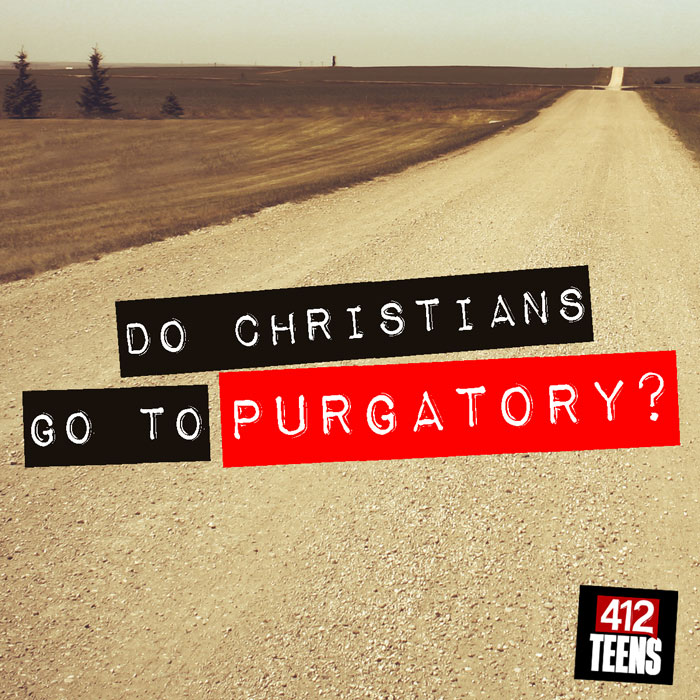Do Christians go to purgatory?

"And you, who were dead in your trespasses and the uncircumcision of your flesh, God made alive together with him, having forgiven us all our trespasses, by canceling the record of debt that stood against us with its legal demands. This he set aside, nailing it to the cross." —Colossians 2:13-14
The Bible is clear that Jesus paid the penalty for all of our sins—past, present, and future (Hebrews 10:12; 1 John 1:7), and that, after death, we will immediately see the Lord (2 Corinthians 5:6; Philippians 1:23). But some people teach a sort of "intermedial" state where our souls go after we die but before we go to be with the Lord. This idea of an "in-between" state for us after our death is often called "purgatory."
While purgatory is an unbiblical concept, it's still something that's taught today in some major faiths, so let's talk about it...
What is purgatory?
The doctrine of purgatory is the belief that, even after receiving Christ's gift of grace, we may still fall into sin that needs to be paid for, and that, after we die, we must be purified of this sin so that we can enter the presence of God in heaven.
According to those who believe in purgatory, we need to "burn off" all the extra sins that were unpaid by Jesus on the cross. These are supposedly sins that we left unattended due to a failure to participate in God's means of grace to us through religious sacraments.
This doctrine is a uniquely Roman Catholic belief. Neither Protestant nor Eastern Orthodox Christians hold to this belief. According to the Catechism of the Catholic Church: "All who die in God's grace and friendship, but still imperfectly purified, are indeed assured of their eternal salvation; but after death they undergo purification, so as to achieve the holiness necessary to enter the joy of heaven."
Does the Bible teach that we need further purification after salvation?
The Bible talks about us being tested and saved "through fire" (1 Corinthians 3:12-15), which some argue to be proof of purgatory. They believe this passage means we still need to still be cleansed from our sins—even after being forgiven through Christ. But that's taking the passage out of context.
"On the judgment day, fire will reveal what kind of work each builder has done. The fire will show if a person's work has any value. If the work survives, that builder will receive a reward. But if the work is burned up, the builder will suffer great loss. The builder will be saved, but like someone barely escaping through a wall of flames." —1 Corinthians 3:13-15 (NLT)
Taking it in context, this passage is actually talking about the quality of our works being tested—not undergoing purification through fire in order to be cleansed and then deemed "good enough" to enter God's presence. Yes, Christians are supposed to serve God and do good works, which we will receive rewards for (1 Corinthians 3:8; Revelation 22:12), but it's NOT those works that save us.
"For by grace you have been saved through faith. And this is not your own doing; it is the gift of God, not a result of works, so that no one may boast." —Ephesians 2:8-9
Faith is all it takes to receive God's full measure of grace. If someone professes genuine faith but lacks spiritual maturity in their actions, they're still saved, though they might not get as big of a reward in heaven. Thus, 1 Corinthians 3:13-15 is talking about how a Christian's works will be tested and may be lost to the fire—but only the works and not the believer.
Jesus paid for ALL our sins.
"If we confess our sins, [God] is faithful and just to forgive us our sins and to cleanse us from all unrighteousness." —1 John 1:9
Purgatory cannot exist because we no longer need to be purified beyond Christ's work on the cross. We are thoroughly washed clean from our sins when we accept the gift of salvation through Christ. Psalm 103:12 says that "as far as the east is from the west, so far does [God] remove our transgressions from us." In fact, the Bible explicitly teaches that Jesus' sacrifice paid for our sins once and for all.

"Unlike those other high priests, [Jesus] does not need to offer sacrifices every day. They did this for their own sins first and then for the sins of the people. But Jesus did this once for all when he offered himself as the sacrifice for the people's sins." —Hebrews 7:27 (NLT)
The thing about Jesus' sacrifice on the cross is that the act itself was so powerful that it covers us completely. God himself literally gave His own mortal life up as an atoning sacrifice for the benefit of humanity (John 3:16-17). If we accept God's offer of grace through faith in Jesus, then there's nothing left to be paid for. Jesus paid for it Himself—in full!
Believers are no longer condemned.
"There is therefore now no condemnation for those who are in Christ Jesus." —Romans 8:1
One of the biggest issues with the doctrine of purgatory is that it misses the whole point of God's grace. If we must be obedient to religious sacraments, then our salvation is up to US—not a result of God's grace for us. Christ's death was sufficient to pay for the sins of the world, and if we receive that payment, we are completely debt free.
Because we have received our undeserved forgiveness and grace from God, we can now stand before Him with confidence, knowing that He will no longer see our sin (1 Corinthians 1:30). Instead, His Son's righteousness has us covered (2 Corinthians 5:21). And our confidence in this reality isn't because we "suffered for a time" in order to make up for what Jesus didn't cover, but that Christ alone has purified us through His blood. For those who are saved, upon death, and in an instant, we will be completely sanctified and holy in God's sight.
"God has united you with Christ Jesus. For our benefit God made him to be wisdom itself. Christ made us right with God; he made us pure and holy, and he freed us from sin." —1 Corinthians 1:30 (NLT)
ALSO SEE:
- What is salvation?
- How can I be saved?
- Are Catholics saved?
- What is the grace of God?
- Are all my past, present, and future sins forgiven?
- How can I receive forgiveness from God?
- Will God forgive me no matter what?
- Why do people die?
- What happens after death?
- Does God know the exact day and time when I'll die?
- How can I overcome the fear of death?
- What counts as good works?
- What does it mean to read the Bible in context?


TL;DR
The Catholic doctrine of purgatory is the belief that, even after receiving Christ's gift of grace, we may still fall into sin that needs to be paid for, and that, after we die, we must be purified of this sin so we can enter God's presence in heaven. This isn't a biblical concept because it contradicts the doctrine of God's grace and salvation through Christ alone (John 3:16-17; Ephesians 2:8-9). Jesus paid for all of our sins already (Hebrews 10:12; Psalm 103:12). When we die, we will immediately see God (2 Corinthians 5:6; Philippians 1:23). Those who have been saved by God's grace are no longer condemned (Romans 8:1), so we can have confidence that when we stand before God, we are covered by Christ's righteousness (1 Corinthians 1:30).

Writer: Andrew Stout
Andrew Stout is a young adult who converted to Christianity at age 15 in 2021. In addition to writing articles, he is a member and moderator of the 412teens Discord server and makes short form videos for the 412teens social media channels. His hobbies include hiking, making videos, and discussing theology.
